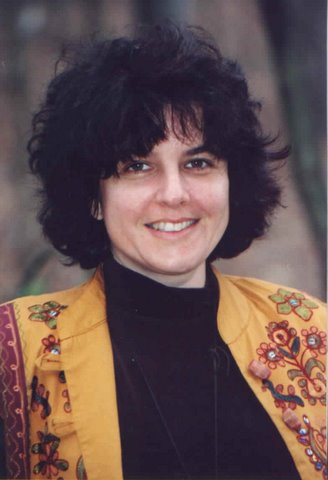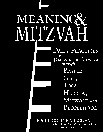
|
The Philadelphia Jewish Voice |
 Living
Judaism
Living
Judaism
The Living Judaism feature in each issue focuses on Jewish spirituality,
meaning and activism with invited columns written by rabbis belonging to the
various movements of Judaism. Jewish clergy interested in writing for Living
Judaism are invited to make contact with Rabbi Goldie Milgram at judaism @ pjvoice.com
Why Jews are Like Baking Powder?
Jews are just under 0.2% of the world population. I like to think of us as baking powder in the cake of creation. We have always been a minute, potent component of the world’s peoples – effective out of proportion to our numbers because most of us are F.F.B. No, not "frum (religious) from birth", but rather Focused From Birth – focused by our parents and our tradition upon one overarching commitment and that is a….
Commitment to social equality. In Elliot Dorff’s powerful new book, The Way into Tikkun Olam (Jewish Lights, Fall 2005), he cites numerous national studies that respectively reveal social equality as the primary covenantal connector of 47, 50 and 21% of Jews surveyed by our major national organizations. In those various studies only 17, 24 and 13% cited religious observance as "the quality most important to their Jewish identity."
Accordingly, many Jew are Democrats or non-Republicans. We are oriented from birth to be unable to bear trickle-down economics, where-by the supernal dew of society’s surplus is munificently harvested through high-end fundraisers where the flowers cost more than many years of a recipient’s earnings. Ah. That felt good to say. President Bush and much of his administration, with their ruinous and wretched social policies could easily occupy the rest of this column. But for Jews, this is not the season for such feel-good-finger-pointing.
The cake of civilization in the United States is falling flat despite the great initiatives many of us support. We all witnessed the failure of local Democratic governments in the South to have effective evacuation plans in place for the poor and vulnerable. This column appears near or within High Holy Day season, where we learn from birth to take responsibility: "Ashamu" – "we are guilty." We tolerate the status quo, we benefit from unfettered capitalism, we vote uncritically along party lines, we also have patronage …." Maybe not ever day and on every issue do any one of us acquiesce, but we as a people have not been ethically engaged proportional to our ability.
We have not been sufficiently aware and now we are reminded that anarchy is indeed a penalty always waiting in the wings of social inequality. As a social worker, long before becoming a rabbi, I personally represented the Jewish Federation to the Red Cross and Philadelphia city’s disaster planning teams and we didn’t get the details right either, not based on what’s happened in New Orleans. We too were blind to the magnitude of tragedy that poverty and disempowerment can yield.
Jews are trauma experts from history-long experience and we re-traumatize easily. Then we become dangerous to ourselves and others, withdrawing into parties and positions that appear to consolidate power, offer control and particularly quell the deeply embedded FEAR that hovers just behind our success and acceptance in any society. We forget that fear is also an acronym: False Evidence Appearing Real. We forget that giving of what one has and creating social equality does not result in loss; it fuels the buy-in for every person that leads to a safe society and even happiness.
The mistakes of the Democratic government in New Orleans mirrors gaps all over the country and within our own personal lives between political theory, social policy, and deeply considered ethical practice. What steps have we taken to regulate lawyers –the best represented profession among elected office holders - from presiding over their own cookie jar of unfettered capitalism? How many of you know physicians who are leaving this state due to practice stress, excess patient and regulatory loads or who are caving under over $100,000 malpractice premiums? And how many readers know small business persons are giving up because of soaring insurance costs and regulations? And all too often, amidst the many deeds of glorious loving kindness attending the Katrina crisis, we keep hearing the risk of liability staying the hand of possible helpers in both private and government sectors.
The above is just one corner of the field of our lives that needs reshaping so that social equality can thrive. But I’m not sure I’m being sufficiently annoying. Fritz Perls, the father of Gestalt therapy, noted that people grow through skillful irritation. And Rabbi Adin Steinsaltz teaches that a Jew is never meant to feel complacent.
Our people’s dominant way of refining creation is to keep realigning our hearts and actions toward justice and loving-kindness, a process that is essential to our people’s ability to fulfilling our chosen identity – being a force for social equality. Whether secular or religious, this realignment practice undergirds our people’s social consciousness and drive. Done with full integrity, it is a process called teshuvah gemorah, meaning "a complete turning," – realignment, of our society and relationships toward respectful engaged, mutually committed living.
Teshuvah means either you or someone who feels connected to you is knocking on the door to your heart and your task is to begin to listen and let honest awareness in. The next step is taking responsibility and entering constructive, committed change. As many great teachers have pointed out, teshuvah is joyful because it embodies the potential for a better future and can heal the deepest wounds in self, other and society. If you have ever felt teshuvah gemorah happen in your own life, then you know its incredible power.
The Jewish People has never won any popularity contests among the nations. At our best we are indeed skillful and necessary irritants – lobbying within and beyond for social equality, that the cake of civilization might rise yet again.
Previous Columns:
- July 2005: Loving and Listening: Mezuzah Consciousness
- August 2005: What Kind are You?
- September 2005: Is Judaism the Religion of Love?
See also Justice, Pursue Justice by Jonathan Kremer in this issue.

SPIRITUAL PRACTICE IS AN OPPORTUNITY;
IT’S HOLY AND HEALTHY TO EXPERIMENT, EXPLORE
Too often people view spiritual practice as a step-by-step chore rather than as a personal opportunity. It is too easy to approach rituals and prayers as something that are just supposed to be done—and then do them mindlessly—rather than become engaged in the process and discover what impact they can have on everyday living. When approached as an opportunity rather than as a bothersome obligation, spiritual traditions and rituals can illuminate the soul.
"This book is part of a series called Reclaiming Judaism, and is designed to offer the Jewish education so many of us longer for – relevant, meaningful and nourishing for the human spirit," explains Rabbi Goldie Milgram, called the "Rebbe on the Road" because of her international teaching schedule, in MEANING AND MITZVAH: Daily Practices for Reclaiming Judaism through Prayer, God, Torah, Hebrew, Mitzvot and Peoplehood (Jewish Lights / October 2005 / Quality Paperback Original / $19.99). "We have hundreds of mitzvot—actions and attitudes to be undertaken with curiosity and consciousness and to be continuously explored so that we can access and activate their many spiritual health benefits for ourselves, others and the planet."
MEANING AND MITZVAH provides a framework for understanding the powerful and often unexplained intellectual, emotional and spiritual tools that are essential for a lively, relevant and fulfilling Jewish spiritual practice. Chapters provide step-by-step, recipe-like guides to a particular Jewish practice or group of practices, give examples of how they may unfold in life, and show how each can help refuel spirit throughout the day.
Rabbi Goldie Milgram is founder and executive director of ReclaimingJudaism.org, offering seminars and Web-based resources on the application of Jewish spiritual practice for spiritual seekers and teachers. Passionate about bringing spirituality back into Jewish life, she is well known for her more than thirty years of innovation in Jewish life—in contexts as diverse as Esalen, Elat Chayyim, Princeton University and Bard College, the United Jewish Communities, Hadassah Foundation and the training of rabbis and cantors for almost seven years as dean at the Academy for Jewish Religion in New York City. She is the author of Reclaiming Judaism as a Spiritual Practice: Holy Days and Shabbat (Jewish Lights) and Make Your Own Bar/Bat Mitzvah: A Personal Guide to a Meaningful Rite of Passage (Jossey Bass).